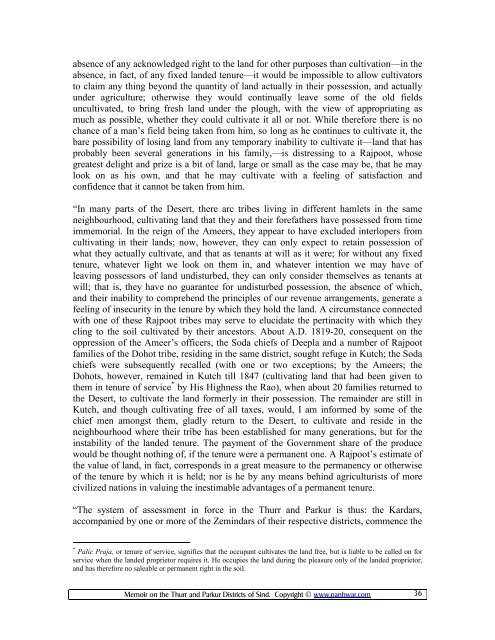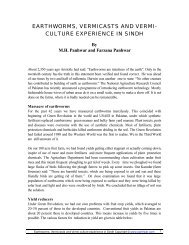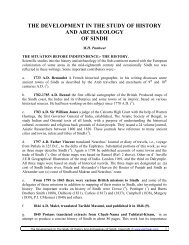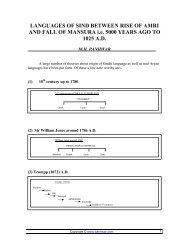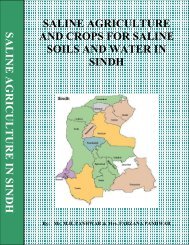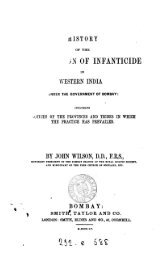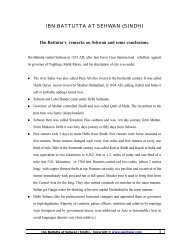Memoir on Thar and
Memoir on Thar and
Memoir on Thar and
You also want an ePaper? Increase the reach of your titles
YUMPU automatically turns print PDFs into web optimized ePapers that Google loves.
absence of any acknowledged right to the l<strong>and</strong> for other purposes than cultivati<strong>on</strong>—in the<br />
absence, in fact, of any fixed l<strong>and</strong>ed tenure—it would be impossible to allow cultivators<br />
to claim any thing bey<strong>on</strong>d the quantity of l<strong>and</strong> actually in their possessi<strong>on</strong>, <strong>and</strong> actually<br />
under agriculture; otherwise they would c<strong>on</strong>tinually leave some of the old fields<br />
uncultivated, to bring fresh l<strong>and</strong> under the plough, with the view of appropriating as<br />
much as possible, whether they could cultivate it all or not. While therefore there is no<br />
chance of a man’s field being taken from him, so l<strong>on</strong>g as he c<strong>on</strong>tinues to cultivate it, the<br />
bare possibility of losing l<strong>and</strong> from any temporary inability to cultivate it—l<strong>and</strong> that has<br />
probably been several generati<strong>on</strong>s in his family,—is distressing to a Rajpoot, whose<br />
greatest delight <strong>and</strong> prize is a bit of l<strong>and</strong>, large or small as the case may be, that he may<br />
look <strong>on</strong> as his own, <strong>and</strong> that he may cultivate with a feeling of satisfacti<strong>on</strong> <strong>and</strong><br />
c<strong>on</strong>fidence that it cannot be taken from him.<br />
“In many parts of the Desert, there arc tribes living in different hamlets in the same<br />
neighbourhood, cultivating l<strong>and</strong> that they <strong>and</strong> their forefathers have possessed from time<br />
immemorial. In the reign of the Ameers, they appear to have excluded interlopers from<br />
cultivating in their l<strong>and</strong>s; now, however, they can <strong>on</strong>ly expect to retain possessi<strong>on</strong> of<br />
what they actually cultivate, <strong>and</strong> that as tenants at will as it were; for without any fixed<br />
tenure, whatever light we look <strong>on</strong> them in, <strong>and</strong> whatever intenti<strong>on</strong> we may have of<br />
leaving possessors of l<strong>and</strong> undisturbed, they can <strong>on</strong>ly c<strong>on</strong>sider themselves as tenants at<br />
will; that is, they have no guarantee for undisturbed possessi<strong>on</strong>, the absence of which,<br />
<strong>and</strong> their inability to comprehend the principles of our revenue arrangements, generate a<br />
feeling of insecurity in the tenure by which they hold the l<strong>and</strong>. A circumstance c<strong>on</strong>nected<br />
with <strong>on</strong>e of these Rajpoot tribes may serve to elucidate the pertinacity with which they<br />
cling to the soil cultivated by their ancestors. About A.D. 1819-20, c<strong>on</strong>sequent <strong>on</strong> the<br />
oppressi<strong>on</strong> of the Ameer’s officers, the Soda chiefs of Deepla <strong>and</strong> a number of Rajpoot<br />
families of the Dohot tribe, residing in the same district, sought refuge in Kutch; the Soda<br />
chiefs were subsequently recalled (with <strong>on</strong>e or two excepti<strong>on</strong>s; by the Ameers; the<br />
Dohots, however, remained in Kutch till 1847 (cultivating l<strong>and</strong> that had been given to<br />
them in tenure of service * by His Highness the Rao), when about 20 families returned to<br />
the Desert, to cultivate the l<strong>and</strong> formerly in their possessi<strong>on</strong>. The remainder are still in<br />
Kutch, <strong>and</strong> though cultivating free of all taxes, would, I am informed by some of the<br />
chief men am<strong>on</strong>gst them, gladly return to the Desert, to cultivate <strong>and</strong> reside in the<br />
neighbourhood where their tribe has been established for many generati<strong>on</strong>s, but for the<br />
instability of the l<strong>and</strong>ed tenure. The payment of the Government share of the produce<br />
would be thought nothing of, if the tenure were a permanent <strong>on</strong>e. A Rajpoot’s estimate of<br />
the value of l<strong>and</strong>, in fact, corresp<strong>on</strong>ds in a great measure to the permanency or otherwise<br />
of the tenure by which it is held; nor is he by any means behind agriculturists of more<br />
civilized nati<strong>on</strong>s in valuing the inestimable advantages of a permanent tenure.<br />
“The system of assessment in force in the Thurr <strong>and</strong> Parkur is thus: the Kardars,<br />
accompanied by <strong>on</strong>e or more of the Zemindars of their respective districts, commence the<br />
* Palic Praja, or tenure of service, signifies that the occupant cultivates the l<strong>and</strong> free, but is liable to be called <strong>on</strong> for<br />
service when the l<strong>and</strong>ed proprietor requires it. He occupies the l<strong>and</strong> during the pleasure <strong>on</strong>ly of the l<strong>and</strong>ed proprietor,<br />
<strong>and</strong> has therefore no saleable or permanent right in the soil.<br />
<str<strong>on</strong>g>Memoir</str<strong>on</strong>g> <strong>on</strong> the Thurr <strong>and</strong> Parkur Districts of Sind. Copyright © www.panhwar.com<br />
36


